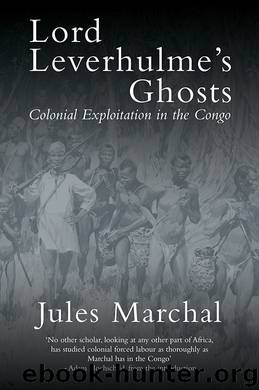Lord Leverhulme's Ghosts by Jules Marchal

Author:Jules Marchal
Language: eng
Format: epub
Publisher: Verso Books
What this quotation clearly means is that the Africans have the right to 1.75 hectares in fields and fallow land, but not to the palm groves, since they were not exploiting them commercially in 1911. Duchesne agreed with this outrageous claim, and had therefore laid down in the above-mentioned telegram to the governor of Mbandaka that 1.75 hectares was the total average surface area granted to each inhabitant as land, be it inhabited, cultivated or lying fallow.20
One cannot help but be staggered by Duchesne’s obsequious attitude towards the HCB bosses. I imagine that it was for form’s sake that in his telegram he was revoking the application of the minister’s directive of March 1917, which was anyway unenforceable. But why then stipulate that the Africans’ rights in land were limited to cultivated and fallow land, thereby excluding gathering rights in the palm groves? Why follow the company in its determination to confine the Africans to meagre reservations, and why follow it in its avaricious desire to snatch fully operative palm groves from the populous Budja?
At the end of March 1930 Dusseljé, having returned from Alberta to Kinshasa, declared to Duchesne that Chief Ebubu of Warsalaka had told him that he was willing to enter into a contract to supply the company with fruit. He therefore suggested making a fresh attempt to agree a tripartite contract. One might suppose that—following the minister’s decision the previous year to postpone the concluding of previously rejected tripartite contracts—Duchesne would not have acceded to the suggestion. On the contrary, he responded immediately and, in a letter dated 31st March, asked the governor of Equateur province to order the competent authorities to make one last effort to sound out the people in the chefferie in question.21 The district commissioner, Bareau, set to, and found that the people were in fact willing to entertain the idea of a contract for supplying fruit to the HCB, not only in the chefferie of Warsalaka but also elsewhere in the Bumba-Est region. This change of heart was a natural response to the intimidation they had suffered through the tracing by the surveyors of countless demarcation lines across their palm groves in the course of the previous year. These lines, as the HCB agents certainly took care to repeat to them, foretold their future confinement in reservations. The colonial authorities explained to them that the tripartite contract represented their only way of eluding such confinement, and redoubled their efforts to convince them, having received directives from the governor-general, dated 8th May 1930, to do so.22
Luckily for the HCB, deputy public prosecutor Mendiaux was no longer in the area, having left for Mbandaka to perform the duties of chief prosecutor. The management in Alberta helped to ensure the success of the operation by driving up the purchase price of palm fruits to 20 centimes a kilo,23 at a time when the company was paying 6 centimes in Lusanga. In a period of world economic crisis, 20 centimes was a price that the Portuguese traders could not match.
Download
This site does not store any files on its server. We only index and link to content provided by other sites. Please contact the content providers to delete copyright contents if any and email us, we'll remove relevant links or contents immediately.
| Africa | Americas |
| Arctic & Antarctica | Asia |
| Australia & Oceania | Europe |
| Middle East | Russia |
| United States | World |
| Ancient Civilizations | Military |
| Historical Study & Educational Resources |
Goodbye Paradise(2985)
Men at Arms by Terry Pratchett(2414)
Tobruk by Peter Fitzsimons(2068)
Pirate Alley by Terry McKnight(1914)
Arabs by Eugene Rogan(1845)
Borders by unknow(1792)
Belonging by Unknown(1474)
The Biafra Story by Frederick Forsyth(1330)
It's Our Turn to Eat by Michela Wrong(1309)
Botswana--Culture Smart! by Michael Main(1242)
A Winter in Arabia by Freya Stark(1228)
Gandhi by Ramachandra Guha(1199)
Coffee: From Bean to Barista by Robert W. Thurston(1186)
Livingstone by Tim Jeal(1156)
The Falls by Unknown(1147)
The Source by James A. Michener(1140)
The Shield and The Sword by Ernle Bradford(1106)
Egyptian Mythology A Fascinating Guide to Understanding the Gods, Goddesses, Monsters, and Mortals (Greek Mythology - Norse Mythology - Egyptian Mythology) by Matt Clayton(1091)
Africa: Altered States, Ordinary Miracles by Richard Dowden(1083)
